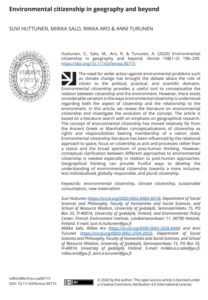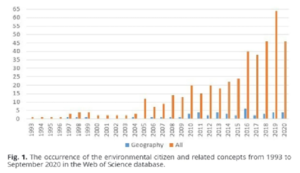Environmental citizenship in geography and beyond
Huttunen, S., Salo, M., Aro, R., & Turunen, A. (2020). Environmental citizenship in geography and beyond. Fennia, 198(1-2) 196–209.
Abstract:
The need for wider action against environmental problems such as climate change has brought the debate about the role of citizen to the political, practical, and scientific domains. Environmental citizenship provides a useful tool to conceptualize the relation between citizenship and the environment. However, there exists considerable variation in the ways environmental citizenship is understood regarding both the aspect of citizenship and the relationship to the environment. In this article, we review the literature on environmental
citizenship and investigate the evolution of the concept. The article is based on a literature search with an emphasis on geographical research. The concept of environmental citizenship has moved relatively far from the Ancient Greek or Marshallian conceptualizations of citizenship as rights and responsibilities bearing membership of a nation state. Environmental citizenship literature has been influenced by the relational approach to space, focus on citizenship as acts and processes rather than a status and the broad spectrum of post-human thinking. However, conceptual clarification between different approaches to environmental citizenship is needed especially in relation to post-human approaches. Geographical thinking can provide fruitful ways to develop the understanding of environmental citizenship towards a more inclusive, less individualized, globally responsible, and plural citizenship.


